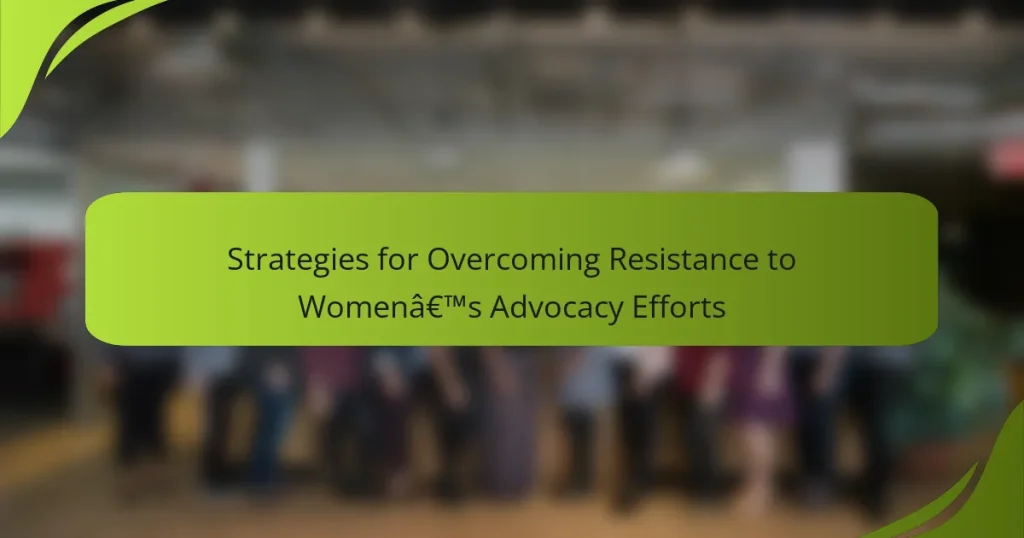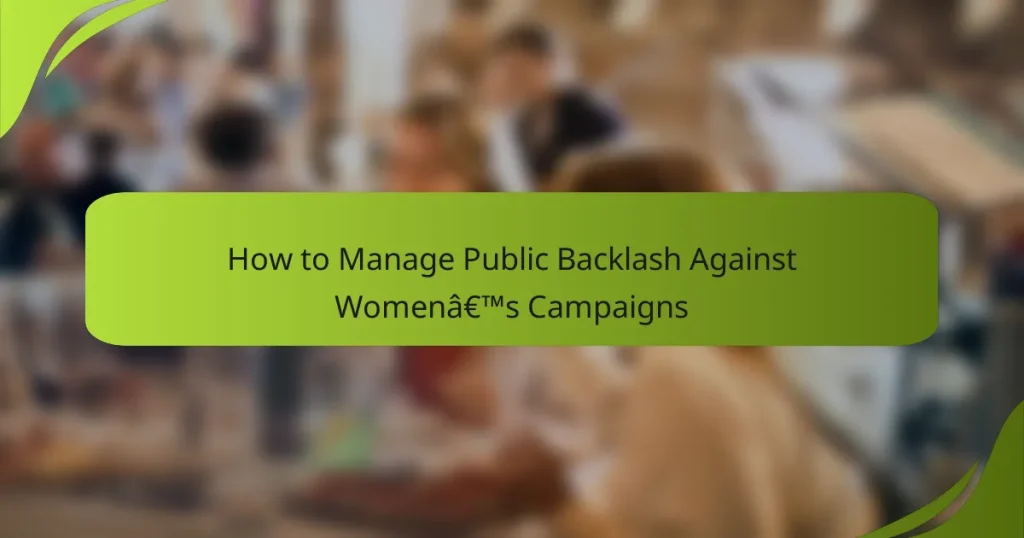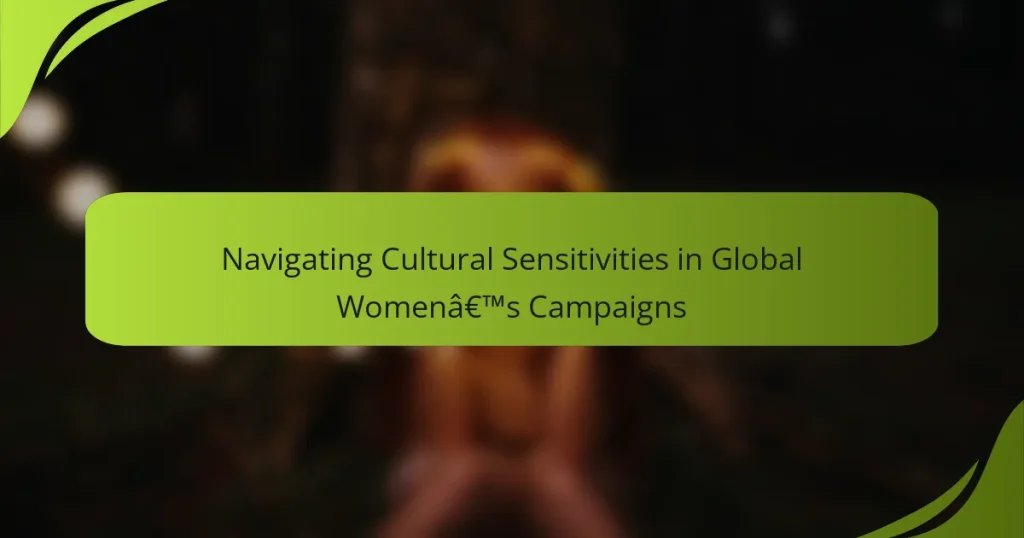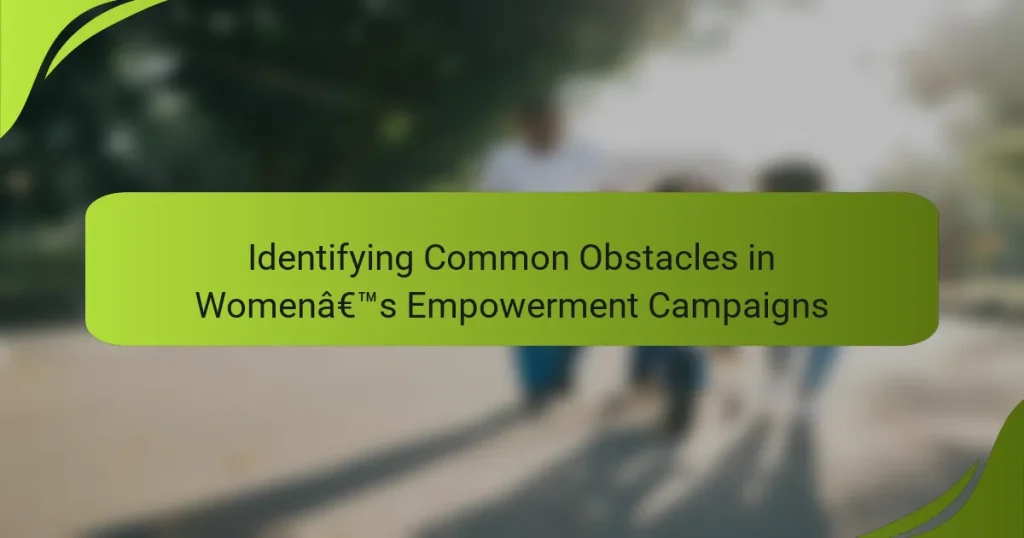Women’s empowerment campaigning faces significant challenges, including entrenched societal norms, inadequate funding, and political resistance. To effectively address these barriers, organizations must adopt targeted strategies that leverage collaboration and technology. Local governments play a pivotal role in fostering an environment conducive to gender equality through supportive policies and community engagement.
How to Manage Public Backlash Against Women’s Campaigns
Navigating Cultural Sensitivities in Global Women’s Campaigns
Identifying Common Obstacles in Women’s Empowerment Campaigns
Identifying Common Obstacles in Women’s Empowerment Campaigns
Identifying Common Obstacles in Women’s Empowerment Campaigns
Identifying Common Obstacles in Women’s Empowerment Campaigns
Identifying Common Obstacles in Women’s Empowerment Campaigns
Identifying Common Obstacles in Women’s Empowerment Campaigns
Identifying Common Obstacles in Women’s Empowerment Campaigns
What are the key challenges in women’s empowerment campaigning?
The key challenges in women’s empowerment campaigning include societal norms, lack of funding, political resistance, insufficient representation, and gender-based violence. Addressing these issues requires targeted strategies and a comprehensive understanding of the barriers women face in various contexts.
Societal norms and stereotypes
Societal norms and stereotypes often dictate the roles women are expected to play, limiting their opportunities for empowerment. These entrenched beliefs can discourage women from pursuing leadership positions or participating in decision-making processes.
Campaigns must challenge these stereotypes by promoting positive role models and showcasing successful women in various fields. Engaging men and boys in discussions about gender equality can also help shift perspectives and foster a more supportive environment.
Lack of funding and resources
A significant barrier to effective women’s empowerment campaigns is the lack of funding and resources. Many initiatives struggle to secure the necessary financial support, which can hinder their ability to reach and impact their target audiences.
To overcome this challenge, organizations can explore diverse funding sources, including grants, partnerships with businesses, and crowdfunding. Building a strong case for investment in women’s empowerment can attract more donors and sponsors.
Political resistance
Political resistance can impede progress in women’s empowerment efforts, especially in regions where gender equality is not prioritized. Policymakers may be reluctant to support initiatives that challenge the status quo or threaten existing power dynamics.
Advocacy and lobbying are crucial to overcoming this resistance. Engaging with policymakers, raising public awareness, and building coalitions can help create a more favorable political climate for women’s empowerment initiatives.
Insufficient representation
Insufficient representation of women in leadership roles and decision-making bodies is a major challenge in women’s empowerment campaigning. When women are underrepresented, their needs and perspectives are often overlooked in policy and program development.
Efforts should focus on increasing women’s representation through targeted recruitment, mentorship programs, and leadership training. Supporting women to run for office or take on leadership roles in organizations can help ensure their voices are heard.
Gender-based violence
Gender-based violence remains a pervasive issue that undermines women’s empowerment efforts. It not only affects women’s physical and mental well-being but also limits their ability to participate fully in society.
Campaigns must address this issue by raising awareness, providing support services for survivors, and advocating for stronger legal protections. Collaborating with law enforcement and community organizations can create a more comprehensive approach to combating gender-based violence.
How can organizations overcome these challenges?
Organizations can overcome challenges in women’s empowerment campaigning by adopting collaborative strategies, utilizing technology, and securing dedicated funding. These approaches can enhance outreach, engagement, and sustainability in their initiatives.
Building community coalitions
Building community coalitions involves bringing together various stakeholders, including local organizations, businesses, and community leaders, to create a unified front for women’s empowerment. This collaboration can amplify resources, share knowledge, and foster a supportive environment.
To establish effective coalitions, organizations should identify common goals and values among partners. Regular meetings and open communication channels can help maintain engagement and ensure that all voices are heard.
Leveraging social media platforms
Leveraging social media platforms is crucial for reaching a wider audience and raising awareness about women’s empowerment issues. Organizations can use platforms like Facebook, Instagram, and Twitter to share stories, promote events, and engage with supporters.
To maximize impact, it’s essential to create compelling content that resonates with the target audience. Utilizing hashtags and collaborating with influencers can further enhance visibility and encourage community participation.
Creating targeted funding initiatives
Creating targeted funding initiatives involves identifying specific financial needs and developing funding strategies that align with those needs. This may include grant applications, crowdfunding campaigns, or partnerships with corporate sponsors.
Organizations should clearly articulate their mission and the impact of their work to attract potential funders. Regularly updating stakeholders on progress and outcomes can help build trust and encourage ongoing support.
Advocating for policy changes
Advocating for policy changes is essential for creating a supportive legal and social framework for women’s empowerment. Organizations can engage in lobbying efforts, public campaigns, and partnerships with policymakers to influence legislation.
To be effective, advocacy efforts should be based on thorough research and community input. Mobilizing grassroots support can amplify the message and demonstrate widespread demand for change, making it more likely to resonate with decision-makers.
What role do local governments play in women’s empowerment?
Local governments are crucial in women’s empowerment by creating an environment that supports gender equality through policies and initiatives. They have the authority to implement regulations, allocate funding, and engage communities in promoting women’s rights and opportunities.
Implementing supportive policies
Local governments can enact policies that promote gender equality, such as equal pay legislation and anti-discrimination laws. By establishing clear guidelines, they can ensure that women have access to the same opportunities as men in various sectors, including employment and education.
Moreover, these policies should be regularly reviewed and updated to reflect the changing needs of the community. Engaging with local women’s organizations can provide valuable insights into the effectiveness of these policies and highlight areas for improvement.
Providing funding for initiatives
Funding is essential for the success of women’s empowerment initiatives at the local level. Governments can allocate budgets specifically for programs that support women’s education, health, and entrepreneurship. This financial backing can help launch projects that directly benefit women in the community.
Additionally, local governments can partner with NGOs and private sectors to leverage additional resources. Establishing grant programs or subsidies can encourage innovative solutions that address the unique challenges faced by women.
Facilitating community engagement
Community engagement is vital for the success of women’s empowerment efforts. Local governments can organize forums, workshops, and outreach programs to raise awareness about women’s rights and available resources. These events can foster dialogue and collaboration among community members.
Encouraging participation from diverse groups, including men and youth, can enhance understanding and support for women’s issues. Local governments should also consider using social media and local media outlets to reach a broader audience and promote active involvement in empowerment initiatives.
How can technology support women’s empowerment campaigns?
Technology can significantly enhance women’s empowerment campaigns by improving outreach, communication, and education. By leveraging various digital tools, organizations can reach wider audiences, foster engagement, and provide valuable resources to women in need.
Utilizing data analytics for outreach
Data analytics plays a crucial role in identifying target demographics and tailoring campaigns effectively. By analyzing social media trends, engagement metrics, and community feedback, organizations can refine their messaging and outreach strategies to resonate with specific groups.
For instance, tracking engagement rates on different platforms can help determine where to allocate resources for maximum impact. Organizations should focus on key performance indicators (KPIs) like reach, conversion rates, and audience demographics to guide their efforts.
Enhancing communication through apps
Mobile applications can facilitate direct communication between organizations and women seeking support. These apps can provide essential information, resources, and community connections, making it easier for users to access help and share experiences.
For example, an app could feature a chat function for real-time support, forums for discussion, and notifications about local events or workshops. Ensuring user-friendly design and accessibility is vital to encourage widespread adoption.
Promoting online education platforms
Online education platforms offer women the opportunity to gain new skills and knowledge at their own pace. These platforms can host courses on various topics, from entrepreneurship to personal finance, empowering women to improve their economic status.
Organizations should consider partnerships with established online education providers to enhance course offerings. Additionally, providing scholarships or financial aid can help ensure that women from diverse backgrounds can access these valuable resources.
What are successful case studies in women’s empowerment?
Successful case studies in women’s empowerment highlight effective strategies and initiatives that have led to significant improvements in women’s rights and opportunities. These examples often involve community engagement, education, and policy advocacy to create lasting change.
Microfinance Initiatives
Microfinance programs have proven effective in empowering women by providing them with access to small loans. These loans enable women to start or expand their businesses, leading to increased income and financial independence. For instance, organizations like Grameen Bank in Bangladesh have successfully supported thousands of women, allowing them to break the cycle of poverty.
When implementing microfinance initiatives, it is crucial to offer financial literacy training alongside loans. This ensures that women can manage their finances effectively and make informed decisions about their businesses. Avoiding high-interest rates is essential to prevent further financial strain on borrowers.
Education and Skill Development
Education and skill development programs are vital components of women’s empowerment. Initiatives that focus on providing vocational training or scholarships for girls can significantly enhance their opportunities in the job market. Programs like the Malala Fund aim to ensure that girls worldwide have access to quality education.
To maximize impact, these educational initiatives should be tailored to local job markets, ensuring that women acquire skills that are in demand. Collaboration with local businesses can facilitate job placements for graduates, creating a direct link between education and employment.
Advocacy and Policy Change
Advocacy for policy change is essential for creating an environment conducive to women’s empowerment. Successful campaigns often focus on legal reforms that protect women’s rights, such as equal pay legislation or anti-discrimination laws. Organizations like UN Women work globally to influence policies that promote gender equality.
Effective advocacy requires building coalitions with various stakeholders, including government agencies, NGOs, and community leaders. Engaging the public through awareness campaigns can also mobilize support for policy changes, making it a collective effort rather than a singular initiative.



